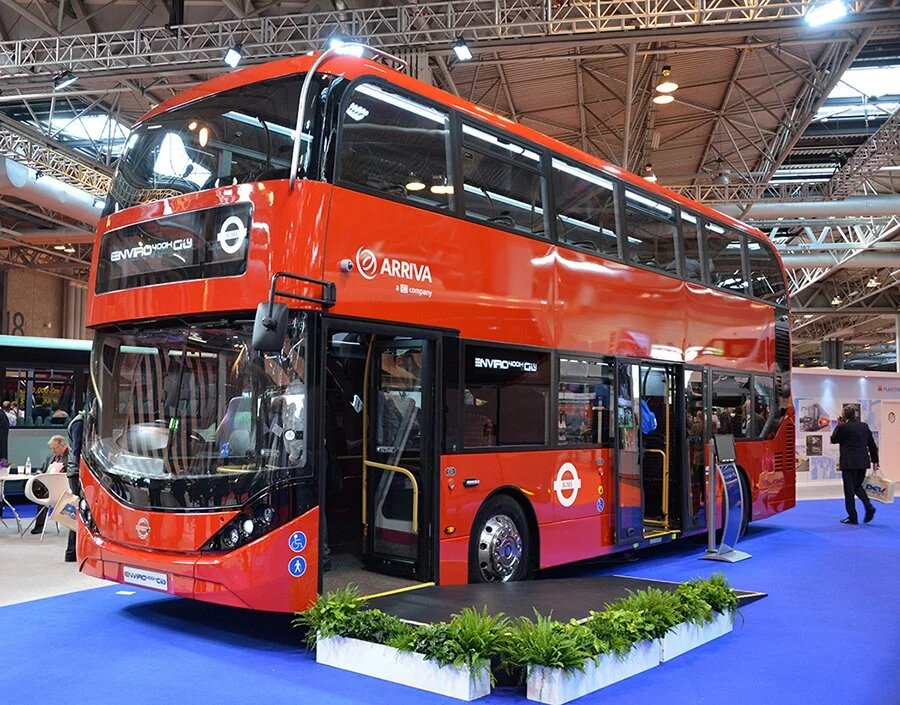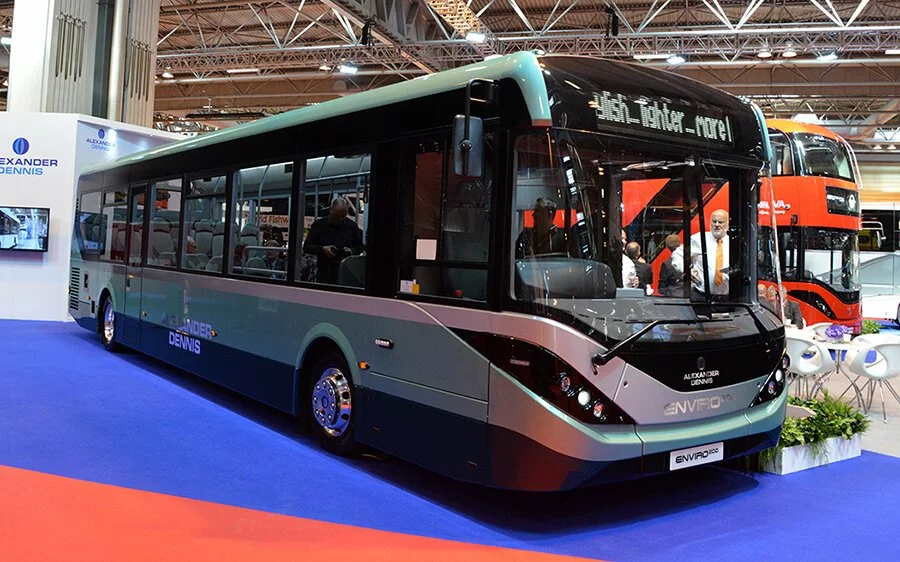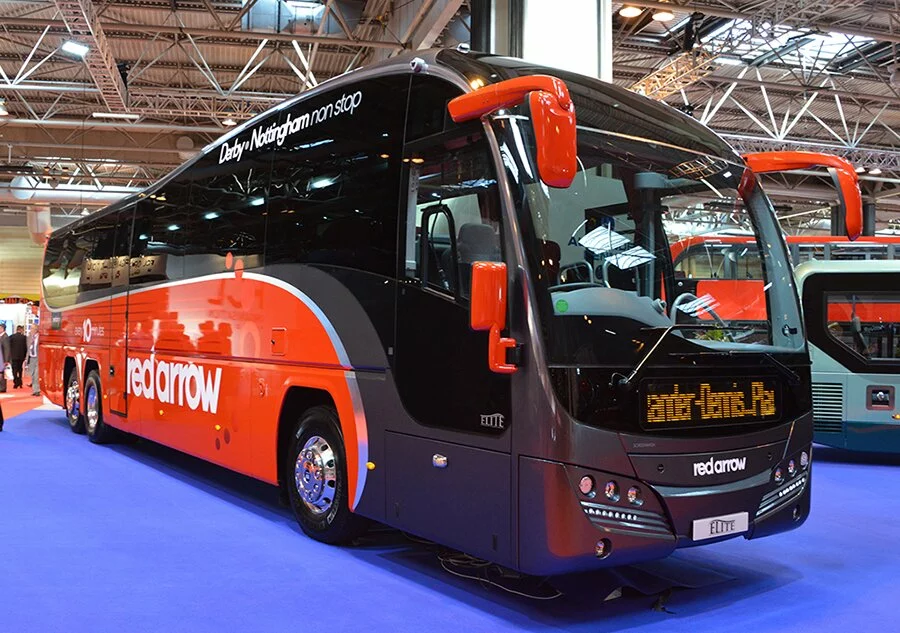- Home Page
- Fleet News Ramblings
- SKM News Views & Blog
- Behind The Picture
- Contact us
Automatic delay repay compensation from Virgin West Coast3/10/2015 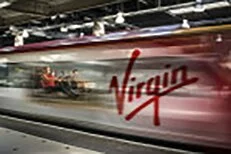
Every now and then Virgin Trains comes out with innovative developments to make traveling with it seamless.
Well, the latest development is up amongst the best of them, Buy an Advance ticket through the train operator’s App or website and if your train is delayed by more than 30 minutes you will get an automatic refund. The money, says Virgin, will be back in the card account used to but the ticket(s) within three days. Wow, what an innovation. No more filling in forms, scanning tickets, emailing or posting them off and getting a rail travel voucher or cheque. Only travel on Virgin’s West Coast services will be part of the initiative and only Advance tickets will qualify, because they are restricted to specific train services and so can easily be identified. The Automatic Delay Repay offer will only apply to delays on Virgin’s West Coast services and will not apply to delays on the connecting services of other train operators. This is probably the biggest online initiative the rail industry has witnessed since Virgin launched internet ticket booking to the rail users with Trainline back in 1997. Whilst only Virgin’s West Coast services qualify at present, Virgin says it is looking at whether the scheme should be extended to its East Coast operation. I wouldn’t be surprised if we don’t start to see other train operators introducing a similar regime in the not to distant future. And the compensation levels. Between 30 and 59 minutes delay 50% of the single ticket cost; between 60 and 119 minutes 100% of the single ticket cost and if the delay is over 120 minutes the compensation level is 100% of the return journey cost. A consequence of the automation will be a massive reduction in the number of manual compensation claims being made through the normal customer relations channels, so I assume that automation could mean reduced costs in running the customer relations team as I suspect less staff will be needed. A 'new' New Bus for London2/10/2015 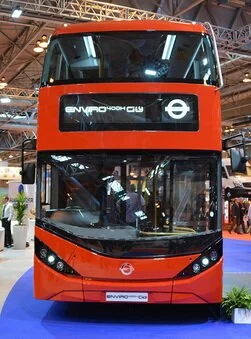
It seems that the New Bus for London, better known as The Borismaster has a rival. Earlier this week ADL unveiled its Enviro 400H City, a hybrid-powered dual door version of its standard Enviro 400MMC model. The demonstrator, which carries Arriva fleetnames, has been built specifically to appeal to Transport for London and offer a conventional-length double deck which would compete against Wrightbus’ New Bus for London.
The interior is finished in a burgundy red and has seating moquette that incorporates elements of standard London material. Given the recent decision of Transport for London to concentrate on two-door operation of the Borismasters the Enviro 400H City offers a real alternative and its shorter length could help it find second hand markets when buses are taken out of London service in the future. What is surprising is how many elements of the Enviro 400H City have similarities with the Borismaster. Front and rear domes and the glazed staircase panel on the off-side have a somewhat Borismaster look to them. Having spent some time looking over the bus it seemed to be getting the thumbs up from the industry professionals who were going over it with a fine toothcomb. ADL also has an Enviro 200MMC on show along with a high-spec finish Plaxton elite coach for Trent Barton. Branded for the Nottingham-Derby service the coach would not be out of place on long distance motorway express services, such is the high-level of finish that Trent Barton have specified. Grumpy Old Man (2): Let me see out of the bus window!2/10/2015 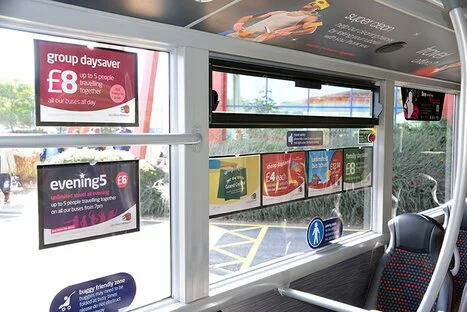
During my recent visit to Coach & Bus Live I was able to have a close look over one of the National Express West Midlands Enviro 400MMCs, which was finished to its premium ‘Platinum’ standard. So what did I think. Finish is good although with greys and blacks punctuated with reds the interior was in my opinion rather dark.
But what struck me was the use of adhesive notice holders covering two windows on the off side of the vehicle. How tacky! Surely there are ways to promote the operators product without taking away the view from the window. If the operator wants to cover windows in its own adverts why not dispense with the window altogether. I am sure many bus users will agree with me, bus windows should be to see through not to plaster with adverts. If National Express West Midlands wants to promote its wares, why not have fablon adverts placed on the narrow opening window vents - these would effectively be back lit during the day and in my opinion would have greater impact. Come on National Express West Midlands, let your passengers look out of bus windows! Grumpy Old Man (1): Less than spotless buses2/10/2015
I have made quite a few bus journeys recently involving major groups and independents and I have to say I’m not sure that some of the big groups put the effort into keeping their buses clean that they should. In fact I am of the opinion that the oft secretive cleaner doesn’t exist anymore. I think what we have is mere litter pickers.
So what makes me take that view. Well in my day, cleaners actually cleaned. Surfaces were wiped, windows were wiped. Buses were cleaned. So what is behind my rant…. Maybe getting older means I have become less tolerant. Maybe. But I sat on a bus the other day and when the doors were closed there was an area at the front of the bus thick in dirt and dust. It would be easy to suggest the area had been cleaned with the entrance doors open as the dirty area would have been behind then when open. But lets not give the operator more credit that it deserves. I would suggest the clean area is when drivers and even passengers sorting out their tickets have put their bags. The window frame areas were clean except where the seat back encroach. I have no doubt the clean areas are where passengers limbs and clothing has rubbed the area. Seat frames were dirty. The cleanliness of some of our buses is not good enough. If buses had to have a hygiene rating them many I have recently traveled on would get a ‘0’! And whilst on the subject of tatty buses. Why does modern moquette only last for 12 months before it fades and after five or six years areas are almost threadbare. In my day we were scrapping 15-20 year old buses that still had seats trimmed in the moquette in which they were delivered. Where has the quality and pride gone? The rail industry can do PR2/10/2015
Despite much of my work these days being bus related, although I do still produce copy for a couple of railway titles, I find it totally out of order for respected rail journalists to continually moan that the railway is incapable of doing effective PR and does not promote, or defend itself.
My first reaction is that said journalists have a short memory. In my time in railway PR these same said journalists have taken full advantage of train operators hospitality. Yes, they have been wined and dined and not just in the UK. Maybe they are programmed to forget the positive and focus on the negative. But wait, perhaps I agree with them! So what do I mean? Well, the Train Operators are extremely good at PR, but it is targeted. PR is about promotion. PR is about awareness. PR is about innovation. Yes, in the early days that I was in the industry we did a significant amount of Project PR. This was followed by Product PR. But them the focus changed to Business PR. Business PR focuses on the customer and stakeholders but it should and must be inclusive of all media. Unfortunately there have been times - including in my time in railway PR - when trade press, and even national press was ‘forgotten’ in a frenzy to pander to the wishes of regional media. It is important in my opinion to keep all media on message and have regular dialogue with them. Where I think the commentators have a valid point is that whilst train operators speak for themselves the industry voice has been lacking. It is hardly surprising since for ATOC, and now the RDG, to speak on behalf of the industry it has to have the support of its members. That means the train and freight operators have to agree the message content and tone. That is not easy but the industry must make it easy. Strong messages are required and they are required now, but commentators shouldn’t tar the whole industry with the same brush. There has been some extremely positive railway PR from the train and freight operators. Claims that the industry doesn’t do PR could result in those train operators reviewing what they do. At worst we could lose what railway PR we have and the industry commentators will have to but their own lunch. |
Steven KnightSteven Knight is a Transport Specialist who has over 40 years experience in the bus and rail industries as well as in specialist transport journalism. He is a member of the Chartered Institute of Journalists. ArchivesJanuary 2021 |
 Create your own unique website with customizable templates.
Create your own unique website with customizable templates.
- Home Page
- Fleet News Ramblings
- SKM News Views & Blog
- Behind The Picture
- Contact us

